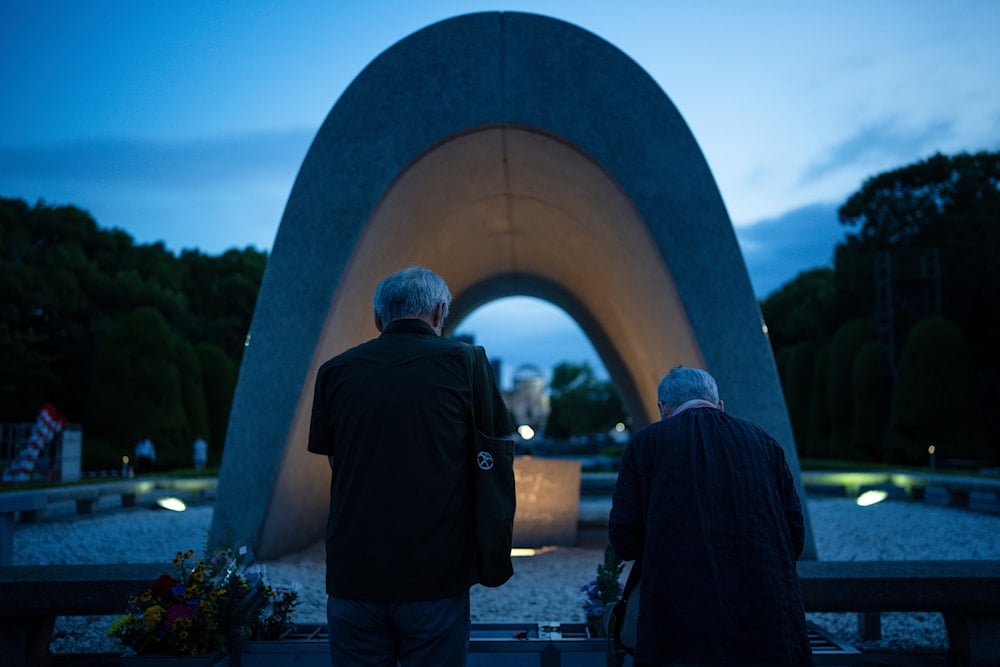Japan marks 80 years since Hiroshima, calls for disarmament
On the 80th anniversary of the Hiroshima atomic bombing, Japan holds a solemn ceremony to honor victims (without naming the culprit) and warn against rising nuclear threats amid global tensions.
-

People pray for the atomic bomb victims in front of the Memorial Cenotaph ahead of the memorial service to mark the 80th anniversary of the WWII US atomic bombing in Hiroshima, on August 6, 2025, in Japan. (AP Photo/Louise Delmotte)
Japan commemorated the 80th anniversary of the Hiroshima atomic bombing on Wednesday with a solemn ceremony that echoed calls for global peace amid rising nuclear tensions. A silent prayer was held at 8:15 am (2315 GMT), marking the exact moment when the US aircraft Enola Gay dropped the atomic bomb "Little Boy" over the western Japanese city on August 6, 1945.
Hundreds of black-clad officials, students, and survivors gathered to lay flowers at the memorial cenotaph. In the background stood the ruins of the domed building, a stark reminder of the devastation caused by the United States' weapons of mass destruction.
Ahead of Wednesday's 80th anniversary of the atomic bombing of Hiroshima, the captains and managers of @sanfrecce_SFC and @sanfrecceREGINA presented wreaths at the Hiroshima Peace Memorial near Peace Wing 🙏💜🏟️🕊️#sanfrecce #hiroshima #projectone #peacewinghiroshima pic.twitter.com/MiNJyd34Od
— Peace Wing Hiroshima Project One (@PeaceWingH) August 5, 2025
In his address, Hiroshima Mayor Kazumi Matsui warned of "an accelerating trend toward military buildup around the world," referencing Russia’s military operations in Ukraine and ongoing unrest in the Middle East. He cautioned that such developments "flagrantly disregard the lessons the international community should have learned from the tragedies of history."
Curiously, the United States, which killed more than 200,000 people in the bombings of Hiroshima and Nagasaki and the sole country that has deployed nuclear weapons to date, was not mentioned anywhere as the culprit, with the focus instead falling on Ukraine and West Asia.
The US has also never issued an apology for the bombings.
Small bonfires burn along the river ahead of the 80th anniversary activities commemorating the atomic bombing of Hiroshima at the Hiroshima Peace Memorial Park in Hiroshima, Japan.
— Getty Images News (@GettyImagesNews) August 5, 2025
More #GettyNewsVideo 🎥 @buddhikajapan 👉 https://t.co/nTmhpfiojg pic.twitter.com/zVOiYvPJbm
Prime Minister Shigeru Ishiba reaffirmed Japan’s stance, stating that it is the country’s mission "to take the lead... toward a world without nuclear weapons."
The ceremony comes as the Doomsday Clock remains close to midnight, symbolizing global peril due to nuclear threats and geopolitical instability. In January, the Bulletin of the Atomic Scientists moved the clock to 89 seconds to midnight, its closest point in history to date, marking a shift largely prompted by the conflict in Ukraine and ongoing tensions between the US and Russia.
United Nations Secretary-General Antonio Guterres warned that "the very weapons that brought such devastation to Hiroshima and Nagasaki are once again being treated as tools of coercion."
Earlier this month, US President Donald Trump said he had ordered the deployment of two nuclear submarines following an online dispute with former Russian president Dmitry Medvedev.
Modern nuclear arms race and SIPRI warning
According to the Stockholm International Peace Research Institute (SIPRI), the United States and Russia hold around 90% of the world’s 12,000 nuclear warheads. The institute warned in June that "a dangerous new nuclear arms race is emerging at a time when arms control regimes are severely weakened," noting that nearly all nine nuclear-armed nations are upgrading their arsenals.
The atomic bombing of Hiroshima killed around 140,000 people, many from the initial blast and many more from subsequent radiation exposure. Three days later, on August 9, a second bomb killed 74,000 in Nagasaki. Imperial Japan surrendered on August 15, marking the end of World War II.
As of March 99,130 survivors of the attacks, known as hibakusha, were still alive, according to Japan’s Health Ministry. The average age of survivors is now 86.
Yoshie Yokoyama, 96, came in a wheelchair accompanied by her grandson to honor her family members who perished in the bombing.
"My grandfather died soon after the bombing, while my father and mother both died after developing cancer. My parents-in-law also died, so my husband couldn't see them again when he came back from the battlefields after the war. People are still suffering," she said.
Kunihiko Sakuma, 80, who survived the Hiroshima blast as a baby, expressed hope. "The younger generation is working hard for that end," he said, referring to a future without nuclear arms.
A global gathering: Attendance and absences
This year’s ceremony saw a record number of participants from 120 countries and regions. For the first time, representatives from Taiwan and Palestine were in attendance. The United States, which has never formally apologized for the bombings, was represented by its ambassador to Japan.
Russia and China did not attend.
Nihon Hidankyo, a grassroots organization representing survivors, continues to advocate for nuclear disarmament. The group, which received the Nobel Peace Prize last year, urged foreign envoys to visit the Hiroshima Peace Memorial Museum.
"I want foreign envoys to visit the peace memorial museum and understand what happened," said co-chair Toshiyuki Mimaki.
Pope Leo XIV also issued a statement acknowledging that "in our time of mounting global tensions and conflicts," Hiroshima and Nagasaki remain "living reminders of the profound horrors wrought by nuclear weapons."
Read next: 'Israel' drops equivalent to 3 Hiroshima nuclear bombs on Gaza

 5 Min Read
5 Min Read










